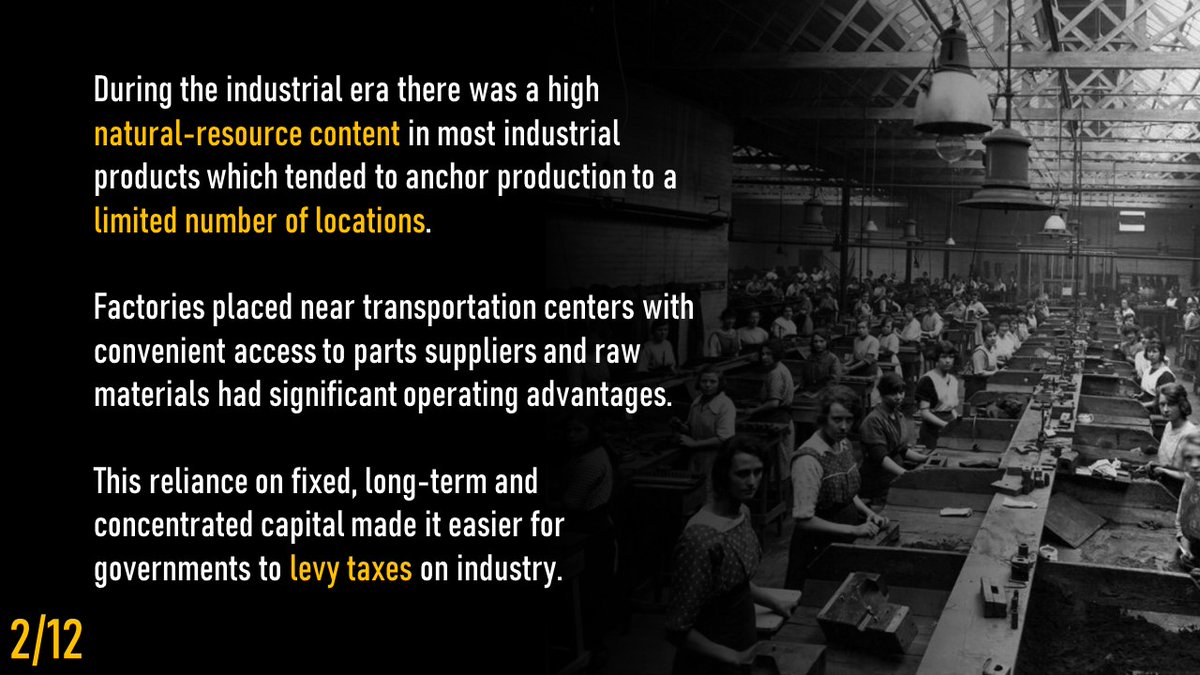
There is often an overlooked tax story at the heart of humanity’s defining events.
@DominicFrisby's book Daylight Robbery provides a fascinating account of the ways in which tax has shaped our past, and will change our future.
This 15 tweet thread explains.👇
@DominicFrisby's book Daylight Robbery provides a fascinating account of the ways in which tax has shaped our past, and will change our future.
This 15 tweet thread explains.👇
1/ Civilisations tend to ascend at times of limited government, strong property rights and low taxes.
But governments often have short-term incentives to expand.
Since tax rises tend to be strongly resisted by the population, they are often introduced during times of crisis.
But governments often have short-term incentives to expand.
Since tax rises tend to be strongly resisted by the population, they are often introduced during times of crisis.
2/ When crises occur, new taxes are presented as temporary, but often become permanent e.g.
>British (1842) and US (1861) incomes taxes, still in place today
>The British window tax of 1696 (not repealed until 1851)
>The 1816 Dallas Tariff which remained until the US Civil War.
>British (1842) and US (1861) incomes taxes, still in place today
>The British window tax of 1696 (not repealed until 1851)
>The 1816 Dallas Tariff which remained until the US Civil War.
3/ During the 20th century, the two world wars gave governments a rationale to extend their tax collection apparatus and increase taxes to historic levels.
In most Western countries government spending as proportion of GDP trebled in the decades after WWI.
In most Western countries government spending as proportion of GDP trebled in the decades after WWI.

4/ Not only did the tax burden rise, but the sources of taxation changed as well.
Income tax became a much more important source of gvt revenue.
In Britain, the standard rate rose from 6% to 30% during WWI.
During WWII, the number of people paying income tax rose 4m to 11m...
Income tax became a much more important source of gvt revenue.
In Britain, the standard rate rose from 6% to 30% during WWI.
During WWII, the number of people paying income tax rose 4m to 11m...
5/>Tax collection became more centralised. In 1900, ⅓ of UK tax was levied locally vs 3-4% today.
>VAT has grown in importance. 166 countries have it today, only 1 (🇫🇷) did in 1960.
>There is more tax through inflation. 1914-2014 was the most inflationary 100 yrs in history.
>VAT has grown in importance. 166 countries have it today, only 1 (🇫🇷) did in 1960.
>There is more tax through inflation. 1914-2014 was the most inflationary 100 yrs in history.
6/ This inflation lowered government borrowing costs and functioned as an indirect tax on currency holders.
Its Cantillon effects redistributed wealth: benefiting government and the financial sector at the expense of savers, borrowers and fixed income earners.
Its Cantillon effects redistributed wealth: benefiting government and the financial sector at the expense of savers, borrowers and fixed income earners.
7/ Inflation has become a defining aspect of our modern financial system.
But it wasn't always this way.
Prior to WWI, Britain's Consumer Price Index was falling.
Between 1800 and 1900, at a time of unprecedented industrial progress, the £'s purchasing power rose by 30%.👇
But it wasn't always this way.
Prior to WWI, Britain's Consumer Price Index was falling.
Between 1800 and 1900, at a time of unprecedented industrial progress, the £'s purchasing power rose by 30%.👇
8/ At this time Britain led the world in technological innovation.
Physicist Jonathan Huebner has argued the 19th century produced more innovations per capita than any other.👇
As @saifedean writes: “our modern world was invented in the gold standard years preceding WWI.”
Physicist Jonathan Huebner has argued the 19th century produced more innovations per capita than any other.👇
As @saifedean writes: “our modern world was invented in the gold standard years preceding WWI.”

9/ After WWII, most countries followed the path of high taxation & inflation.
But territories like Hong Kong took an alternative path and outperformed rivals.
Hong Kong was largely destroyed during WWII, but within 50 yrs it had surpassed the UK and US in per capita GDP.
But territories like Hong Kong took an alternative path and outperformed rivals.
Hong Kong was largely destroyed during WWII, but within 50 yrs it had surpassed the UK and US in per capita GDP.
10/ HK's success can be attributed to its low tax, lean government model.
Its tax burden has never exceeded 14% of GDP, while the UK's has remained >34%.
At 267 pages, HK's tax code is only 1.5% the length of the UK’s.
In the initial decades after WWII, most paid no income tax
Its tax burden has never exceeded 14% of GDP, while the UK's has remained >34%.
At 267 pages, HK's tax code is only 1.5% the length of the UK’s.
In the initial decades after WWII, most paid no income tax
11/ Despite low taxes, Hong Kong has developed some of the best public services in the world.
>The territory has the world's 4th best education system, according to Pearson
>It ranks top of Bloomberg’s healthcare index
>Its metro is profitable and runs on time 99.9% of the time
>The territory has the world's 4th best education system, according to Pearson
>It ranks top of Bloomberg’s healthcare index
>Its metro is profitable and runs on time 99.9% of the time
12/ Today, we stand and on the cusp of a new era for taxation.
A growing % of our services are intangible. Their production doesn't lie neatly within national borders.
People are becoming more mobile, and those on the move end up paying less in council, income or NI tax.
A growing % of our services are intangible. Their production doesn't lie neatly within national borders.
People are becoming more mobile, and those on the move end up paying less in council, income or NI tax.

13/ At the same time, more people (like @aantonop) are transacting and saving in digital currencies.
It is natural that people working in the cyber economy will want to use cybercurrencies, but their adoption makes it harder for governments to quantify economic activity.
It is natural that people working in the cyber economy will want to use cybercurrencies, but their adoption makes it harder for governments to quantify economic activity.
14/ Technological change will force governments to rethink the way they tax.
For countries to remain globally competitive they'll likely need to bring overall tax levels down from the historic highs they have reached.
But doing this will not be easy politically.
For countries to remain globally competitive they'll likely need to bring overall tax levels down from the historic highs they have reached.
But doing this will not be easy politically.
15/ Technology will also change the way in which states levy taxes.
Governments tend to collect taxes where they are easy to collect.
As the economy changes, the result could be a move away from taxing incomes and transactions, to focussing more on fixed assets such as land.
Governments tend to collect taxes where they are easy to collect.
As the economy changes, the result could be a move away from taxing incomes and transactions, to focussing more on fixed assets such as land.
RESOURCES
Daylight Robbery: amzn.to/38p7Xt5
Mind-blowing footage of HK: bit.ly/3i2LPI7
(If you’ve not yet been to Hong Kong, go!)
Jonathan Huebner paper on trends in global innovation: bit.ly/39fMyBD
Full @aantonop interview:
Daylight Robbery: amzn.to/38p7Xt5
Mind-blowing footage of HK: bit.ly/3i2LPI7
(If you’ve not yet been to Hong Kong, go!)
Jonathan Huebner paper on trends in global innovation: bit.ly/39fMyBD
Full @aantonop interview:
Thank you for reading.
If you enjoyed this thread please retweet your favourite tweets to help its message reach a wider audience.
For more like this follow me at @TheAustrian3.
You can access my collated threads on my Medium page: theaustrian3.medium.com
If you enjoyed this thread please retweet your favourite tweets to help its message reach a wider audience.
For more like this follow me at @TheAustrian3.
You can access my collated threads on my Medium page: theaustrian3.medium.com
• • •
Missing some Tweet in this thread? You can try to
force a refresh











